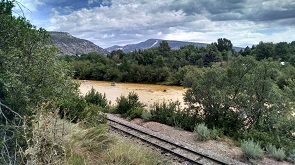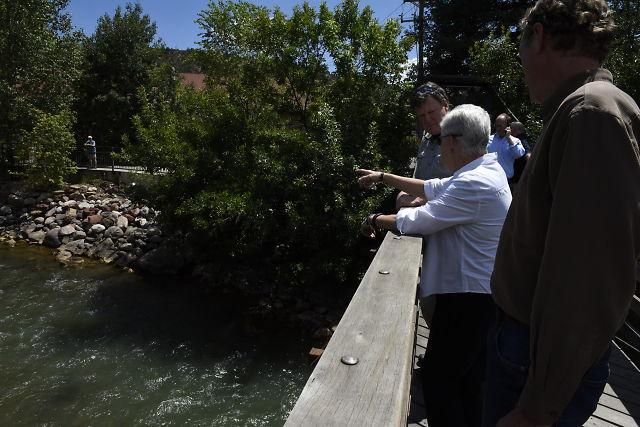WASHINGTON, Aug. 13, 2015- A toxic spill caused by workers employed by the Environmental Protection Agency shut down major irrigation sources for farmers in the region, fueling more animosity toward the agency and triggering lawsuits.
Chad Smith, CEO of New Mexico Farm and Livestock Bureau, told Agri-Pulse that “millions of dollars of income are being lost as alfalfa, melons, chile and tomatoes are parched and dying,” due to farmers not being able to irrigate crops.
Livestock owners are also having to find different sources of water for their animals.
The devastation to the agricultural community in his state is “enormous,” he said, adding that “producers are having to haul in water…and unfortunately there is no end in sight as the EPA test results are delayed.”

While investigating the Gold King Mine in Colorado on Aug. 5, an EPA cleanup team triggered a release of more than three million gallons of mine wastewater into Cement Creek, causing yellow sludge containing lead and arsenic to seep into the Animas and San Juan rivers. The accident shut down all irrigation and drinking water wells sourced from the contaminated water bodies.
Bonnie Hopkins, San Juan County agriculture extension agent, said 2,600 hundred farms and ranches just in her county and about 50,000 livestock, including cattle, sheep, horses, goats, and chickens, are affected “directly or indirectly” by the restrictions on river water use caused by the contamination.
EPA, which is continually testing for toxins and metals in the rivers, said it does not expect to make any reopening decisions until at least Aug. 17.
The governors of Colorado and New Mexico made disaster declarations for areas along the rivers, and the Navajo Nation declared an emergency on Aug. 10 as the waste spread downstream to Utah. The president of the Navajo Nation, Russell Begaye, has said he will sue EPA over the spill.
Tsosie Lewis, CEO of the Navajo Agricultural Products Industry based in New Mexico, said the more than 70 thousand acres he manages are not directly affected because he uses a different water source, but he has provided 24,000 gallons of water so far to Navajo farmers up to 100 miles away.
Estimating that about 500 Navajo farmers are directly impacted by the spill, Lewis said most of their crops were just maturing and “needed another month of irrigation…they’re not going to finish at all.”
EPA Administrator Gina McCarthy visited the mine site in Durango, Colorado, on Wednesday and will visit response efforts in Farmington, New Mexico, today.

“We couldn’t be more sorry,” she said in Durango. “Our mission is to protect human health and the environment. We will hold ourselves to a higher standard than anyone else.”
New data from Aug. 7-9 show water quality levels in the Animas River near Durango are improving, she said. “The river is returning to pre-event conditions,” McCarthy said, adding that testing will continue and more data will be released.
The agricultural community has been fighting the agency on its “waters of the U.S.” rule, which defines its jurisdiction over water bodies under the Clean Water Act. The American Farm Bureau Federation and several other farm groups are suing the agency, claiming the rule overreaches its limits and violates the U.S. Constitution.
“This is a huge environmental disaster caused by the very agency that is supposed to protect the environment,” Smith said. “The agency that is proposing to control all of the waters in the nation through their Waters of the U.S. regulations is the one that fouled a river previously protected by local farmers and ranchers.”
A Colorado Farm Bureau spokesman told Agri-Pulse that farmers and ranchers who depend on the Animas River are frustrated by a lack of communication from EPA regarding the accident.
The uncertainty about the toxicity of the water and how long they will have to hold off on irrigation is fueling frustration, he said. Additionally, many are worried about the consequences of the spill from a marketing standpoint. For example, one sheep farmer in the region is already getting calls canceling lamb orders due to the farm’s proximity to the Animas, the spokesman said.
Colorado Farm Bureau President Don Shawcroft said in an emailed statement that “the lack of transparency and explanation from the EPA to the local communities and industries is unacceptable, irresponsible and exemplifies its inability to handle crises.”
He added: “How are citizens supposed to trust the EPA to protect our waters when it ignores standard waste management protocols and the citizens their actions affect?”
#30
For more news, go to www.agri-pulse.com

